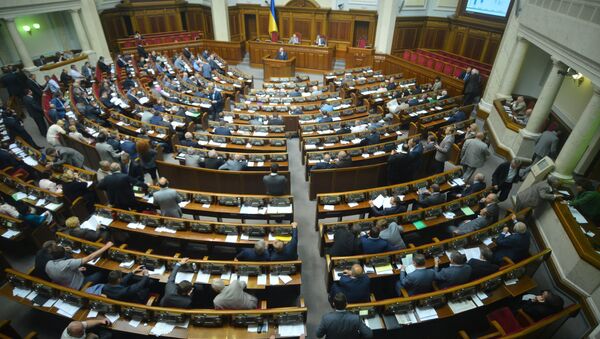Updated 3:08 p.m. Moscow Time
KIEV, September 16 (RIA Novosti) – The Ukrainian parliament on Tuesday approved bills introducing a special self-administration regime in certain areas of the Donetsk and Luhansk regions, as well as granting amnesty for independence supporters who committed administrative or criminal offenses, Ukrainian lawmaker Oleh Tyahnibok said on his official Twitter microblog.
The initiative granting special status was approved by 277 lawmakers, while the amnesty law was approved by 287 parliament members. The bills will come into force after they have been signed by the president and published by official media.
The special status bill, submitted to parliament by President Petro Poroshenko, gives Ukrainian cabinet ministers and other central executive bodies the power to sign agreements with local administrative bodies on social, economic, cultural and other issues. Under the bill, Russian and other languages have equal status with Ukrainian, and the state is obliged to guarantee the right to use Russian or any other language publicly or privately. The bill also sets early local elections for December 7.
Earlier in the day, the leader of the self-proclaimed Luhansk People’s Republic (LPR), Igor Plotnitsky, said the Ukrainian president’s bill is mostly in line with the independence supporters’ wishes and is the first step toward a peaceful settlement. However, previously the leaders of the self-proclaimed republics said they wanted full independence and would not agree to any special status if it meant still being part of Ukraine.
The law on amnesty envisages that militia members and their supporters “are freed from criminal responsibility on the condition they … do not hold anyone hostage, laid their weapons and explosives, do not occupy administrative or other buildings or block state structures and organizations.” Those who agree to the terms will be freed from criminal responsibility or fines. However, the bill does not apply to people suspected of serious criminal offences and those whom the Kiev government has accused of involvement in the MH17 plane crash in eastern Ukraine or posing hindrances to the investigation.
During the Trilateral Contact Group meeting on September 5 in Minsk, Kiev officials and representatives of the two self-proclaimed republics in southeastern Ukraine agreed to a ceasefire. The sides signed a 12-point plan that also said that Ukraine must adopt a new law granting special status to the Luhansk and Donetsk regions and hold early elections there.
Ukrainian President Petro Poroshenko said that the law on the special status of the eastern Ukrainian regions is designed to ensure their “peaceful return under the sovereignty of Ukraine” and underlined that federalization of Ukraine is out of question.




